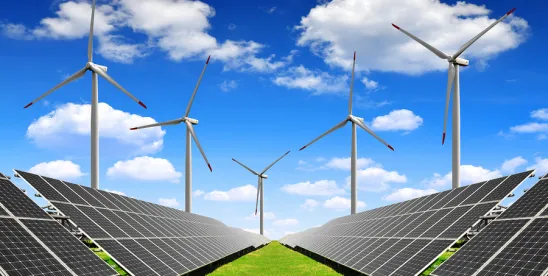-
In March, the Solar Energy Industries Association and Wood Mackenzie published the U.S. Solar Market Insight 2019 Year In Review report (the “Report”) showing a record-breaking year for the industry, including the following highlights:
-
-
Solar topped all other new electricity generating capacity in the United States in 2019 at 40 percent;
-
The solar industry added 13.3 gigawatts (“GW”) of solar photovoltaic (“PV”), accounting for a 23 percent increase over 2018;
-
Residential PV was at an all-time high in the United States, up 15 percent from 2018, with the most solar installations ever recorded;
-
30.4 GWdc of new utility PV projects were announced in 2019, leading to a record high for contracted utility PV pipeline of 48.1 GWdc in 2019; and
-
Despite growth in other areas, nonresidential PV saw an overall decline for the second consecutive year as some development is hampered by jurisdiction-specific regulatory and policy reforms.
-
-
While the Report projects that the total installed PV capacity in the United States will increase by 47 percent in 2020 and the total installed U.S. PV capacity will more than double over the next five years, the Report cautions that it is monitoring the potential impact of the COVID-19 pandemic on the solar industry and the Report’s projections
West Virginia Passes Law Allowing for Utility-Scale Solar Development
-
The West Virginia Legislature recently passed SB 583, which creates a utility-scale solar development program in the primarily coal-powered state. In an effort to attract new businesses to the state that may have renewable energy or sustainability goals, the state’s electric utilities may now each install up to 200 megawatts (“MW”) of solar power. The development must occur in 50 MW increments.
-
The solar program also allows electric utilities to recover development costs of solar installation through the state’s Public Service Commission rate-making process. The bill specifically requires permit approval for these projects within 150 days and concurrent recovery. Notably, the law merely allows for solar development and does not require any percentage of a utility’s energy mix be renewable.
Duke Energy Requests Second Application Day for Rooftop Solar Rebate Applications
-
In order to spread the market for rooftop solar energy rebates throughout the year, Duke Energy Carolinas, LLC and Duke Energy Progress, LLC (together, “Duke Energy”) have proposed, in an annual report on the rebate program, to release half of the rebate capacity in January and the other half in July.
-
As part of 2018 legislation to reform North Carolina’s renewable energy programs, Duke Energy began offering rebates for rooftop solar installations in 2018. However, there is a limited amount of total rebates available, and those seeking the rebate need to apply on the first business day of the calendar year. In January 2020, both companies’ solar rebates were fully claimed within 21 minutes of the application window opening. The rebate program is scheduled to expire (unless it is renewed) in 2022.
Virginia Passes Significant Clean Energy Legislation
-
On April 11, Virginia Governor Ralph Northam signed House Bill 1526 and Senate Bill 851, known as the Virginia Clean Economy Act (the “Act”). Among other things, the Act establishes a renewable portfolio standard (“RPS”) of 100 percent renewable resources by 2050, sets a schedule to close fossil fuel power plants, and sets new energy efficiency measures. The Act specifies interim RPS targets of 58 percent clean power by 2030, 73 percent by 2035, 88 percent by 2040, and 100 percent by 2050. The Act requires the largest utilities in the state, Dominion Energy Virginia and Appalachian Power to be 100 percent carbon-free by 2045 and 2050, respectively.
-
House Bill 981 and Senate Bill 1027 have amended the Clean Energy and Community Flood Preparedness Act to require Virginia to join the Regional Greenhouse Gas Initiative (“RGGI”). The RGGI is a market-based program between Connecticut, Delaware, Maine, Maryland, Massachusetts, New Hampshire, New Jersey, New York, Rhode Island, and Vermont to cap and reduce power-sector carbon dioxide emissions. Virginia’s Department of Environmental Quality will establish and operate an auction program to sell allowances into this market-based trading program.
-
The amended Clean Energy and Community Flood Preparedness Act now establishes a Community Flood Preparedness Fund to create a low-interest loan program — funded by the sale of emissions allowances — to help inland and coastal communities that are subject to recurrent flooding.




 />i
/>i

